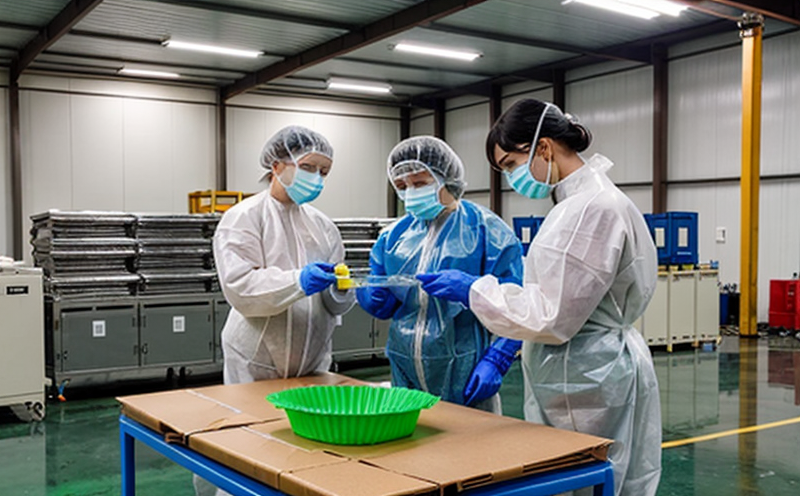ASTM D638-02 Tensile Testing for Rigid Plastics
The ASTM D638 standard provides a method for determining the tensile properties of rigid plastic materials. This service is critical in quality assurance and product development, ensuring that packaging meets performance requirements under various loading conditions.
ASTM D638-02 specifies how to prepare specimens, perform tests, and report results. It applies to plastics with a modulus greater than 1,500 MPa and tensile strength greater than 40 MPa. This service is particularly relevant for rigid plastic packaging materials used in industries such as food, pharmaceuticals, and electronics.
The test method involves clamping the specimen between two grips and applying force until failure occurs. The resulting stress-strain curve provides essential data on the material’s yield strength, ultimate tensile strength (UTS), and modulus of elasticity (Young's Modulus).
Understanding these properties is crucial for designing packaging that can withstand mechanical stresses during manufacturing, handling, and transportation without compromising product integrity.
The process typically begins with selecting appropriate specimens based on the geometry specified in ASTM D638. Specimen dimensions are critical to ensure accurate results; deviations from the standard may lead to erroneous conclusions about material performance.
Proper specimen preparation is crucial for obtaining reliable test data. This includes ensuring flat, clean surfaces free of defects or imperfections that could affect measurement accuracy. Careful handling and storage conditions are also necessary to maintain specimen integrity until testing.
The testing apparatus used for this service must meet strict specifications outlined in ASTM D638. It should be capable of applying controlled loads at a constant rate of elongation, providing precise measurements throughout the entire test cycle.
After completing each test run, detailed reports are generated summarizing key findings such as tensile strength, yield strength, and modulus values along with any observations noted during specimen preparation or testing. These reports serve as valuable references for ongoing quality control efforts and further development work aimed at improving product performance.
| Applied Standards |
|---|
| ASTM D638-02 - Standard Test Method for Tensile Properties of Plastics |
The application of ASTM D638 ensures that the testing process adheres to industry best practices, providing consistent and comparable results across different laboratories. This standard plays a vital role in ensuring high-quality products within various sectors relying on rigid plastic packaging.
For quality managers, compliance officers, R&D engineers, and procurement professionals involved in selecting materials for rigid plastic packaging, understanding the nuances of ASTM D638-02 is essential. By leveraging this service, stakeholders can make informed decisions about material selection and process optimization, ultimately leading to superior end products.
Applied Standards
| ASTM D638-02 - Standard Test Method for Tensile Properties of Plastics |
|---|
| This standard specifies the procedure for determining tensile properties of rigid plastic materials. It covers factors like specimen dimensions, test setup, loading rate, and how to interpret results. |
The ASTM D638-02 method is widely recognized as a benchmark for measuring tensile strength in rigid plastics due to its stringent requirements on sample preparation, testing procedures, and data analysis. Compliance with this standard ensures accurate measurement of material properties which are crucial for designing robust packaging solutions.
Eurolab Advantages in ASTM D638-02 Tensile Testing
At Eurolab, our expertise lies in providing comprehensive testing services tailored to meet the specific needs of packaging manufacturers and other industries reliant on rigid plastic materials.
- Accurate Results: Our state-of-the-art facilities equipped with precision instruments ensure consistent accuracy across all tests conducted according to ASTM D638-02.
- Experienced Technicians: Our team comprises highly skilled professionals who possess extensive knowledge about the nuances of this standard, ensuring compliance throughout every step of the testing process.
- Comprehensive Reporting: Detailed reports are provided after each test run, including all relevant measurements and observations. This information helps clients make informed decisions regarding their packaging designs.
- Fast Turnaround Times: We understand that timely results are important for maintaining production schedules. Therefore, we strive to deliver accurate and reliable outcomes as quickly as possible without compromising on quality.
- Comprehensive Training Programs: For those looking to gain a deeper understanding of ASTM D638-02 or other related standards, Eurolab offers tailored training programs designed specifically for your team members. These sessions cover everything from basic principles to advanced techniques applicable in real-world scenarios.
- Multi-Site Capability: With multiple locations across Europe, Eurolab ensures that regardless of where you are located, our experts can provide support locally while maintaining the highest standards of service.
By choosing Eurolab for your ASTM D638-02 tensile testing needs, you gain access to a range of benefits that enhance both efficiency and accuracy in your quality assurance processes. Our commitment to excellence sets us apart as a trusted partner committed to helping our clients achieve their goals.
Quality and Reliability Assurance
- Consistent Performance: Our testing processes follow strict protocols, ensuring that each test adheres to ASTM D638-02 requirements. This consistency helps maintain product quality across different batches or production runs.
- Data Integrity: All measurements are recorded accurately and stored securely for future reference. Regular audits ensure that our systems remain robust against errors or discrepancies.
- Continuous Improvement: Feedback from clients is used to refine our methodologies continuously, ensuring they stay aligned with the latest industry trends and regulatory changes.
- Industry Expertise: Leveraging years of experience in packaging testing allows us to provide insights beyond just compliance, helping businesses optimize their processes for better outcomes.
At Eurolab, we pride ourselves on delivering not only accurate but also reliable services. By investing in the right tools and training our staff thoroughly, we guarantee that every test conducted meets the highest standards set by ASTM D638-02.





